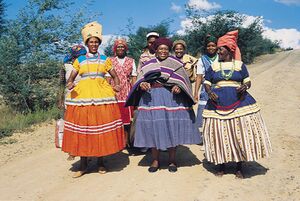Gauteng (Ethnic Group): Difference between revisions
No edit summary |
No edit summary |
||
| Line 7: | Line 7: | ||
The Gauteng also have a rich tradition of oral poetry, which is used to celebrate important events, commemorate important people, and tell stories. These poems are often sung or recited in front of a live audience, and they are accompanied by music and dance. They feature complex wordplay, metaphors, and symbolism, and they are a testament to the rich cultural heritage of the Gauteng people. The Gauteng language and its accompanying oral traditions are an essential part of the tribe's identity, and they play a significant role in preserving their history and culture. | The Gauteng also have a rich tradition of oral poetry, which is used to celebrate important events, commemorate important people, and tell stories. These poems are often sung or recited in front of a live audience, and they are accompanied by music and dance. They feature complex wordplay, metaphors, and symbolism, and they are a testament to the rich cultural heritage of the Gauteng people. The Gauteng language and its accompanying oral traditions are an essential part of the tribe's identity, and they play a significant role in preserving their history and culture. | ||
===Religion=== | |||
The Gauteng people have a unique blend of religious practices that reflect their cultural heritage. The majority of Gauteng people are Roman Catholic, and while they have adopted many Catholic traditions and practices, including the celebration of Mass, baptism, and communion they also incorporate elements of their native religion into their Catholic faith. For example, the tribe has its own unique interpretation of Catholic saints, and they often blend their own cultural traditions and beliefs with Catholic religious practices. | |||
Additionally, some Gauteng people still practice their traditional religion, which centers around a belief in ancestral spirits and the power of nature. This religion is often practiced alongside Catholicism and reflects the tribe's deep connection to the natural world. | |||
==Clothing== | ==Clothing== | ||
Revision as of 20:16, 7 April 2023
The Gauteng are a Hesperidesian Native tribe that primarily inhabits Gautenga, in Central Hesperidesia. While most Gauteng people live in Gautenga, there are also groups who live in neighboring Jafala and Kwalawi, as well as small populations in the Blackhelm Confederacy and elsewhere in Astyria.
Culture
One of the central aspects of Gauteng culture is their emphasis on livestock, particularly cattle. Like many Hesperidesian tribes, the Gauteng view cattle as a symbol of wealth and status, and they play a significant role in their daily lives. Cattle are used for meat, milk, and as a form of currency. In addition to their importance in everyday life, cattle also play a crucial role in many of the tribe's rituals and ceremonies.
The Gauteng also have a rich tradition of oral poetry, which is used to celebrate important events, commemorate important people, and tell stories. These poems are often sung or recited in front of a live audience, and they are accompanied by music and dance. They feature complex wordplay, metaphors, and symbolism, and they are a testament to the rich cultural heritage of the Gauteng people. The Gauteng language and its accompanying oral traditions are an essential part of the tribe's identity, and they play a significant role in preserving their history and culture.
Religion
The Gauteng people have a unique blend of religious practices that reflect their cultural heritage. The majority of Gauteng people are Roman Catholic, and while they have adopted many Catholic traditions and practices, including the celebration of Mass, baptism, and communion they also incorporate elements of their native religion into their Catholic faith. For example, the tribe has its own unique interpretation of Catholic saints, and they often blend their own cultural traditions and beliefs with Catholic religious practices.
Additionally, some Gauteng people still practice their traditional religion, which centers around a belief in ancestral spirits and the power of nature. This religion is often practiced alongside Catholicism and reflects the tribe's deep connection to the natural world.
Clothing
The Gauteng have a unique style of traditional dress that is most often seen during rituals and other ethnic celebrations, although some - particularly in rural areas - still regularly wear these styles to preserve their cultural traditions. Men often wear brightly colored robes or tunics, which are made from local fabrics and adorned with intricate patterns and designs. Women typically wear brightly colored dresses or skirts, also made from local fabrics, and they often adorn themselves with beaded jewelry, including necklaces, bracelets, and earrings.
In addition to their traditional clothing, the Gauteng also have a rich tradition of body art. They use natural dyes to paint intricate patterns and designs on their bodies, which are believed to have symbolic meaning. These designs often represent animals, plants, or other elements of the natural world, and they are a source of pride and identity for the tribe.
Language
The Gauteng language is a unique and complex language that is spoken exclusively within the tribe. It is a tonal language, meaning that the pitch or tone of a word can change its meaning. Gauteng has a rich vocabulary with many words that describe the natural world, including animals, plants, and weather patterns. It also has many words related to social structures and family relationships, which are central to Gauteng culture.
Gauteng is a primarily spoken language, but the tribe also uses a variety of symbols and gestures to communicate, particularly in situations where words may not be appropriate or possible.
